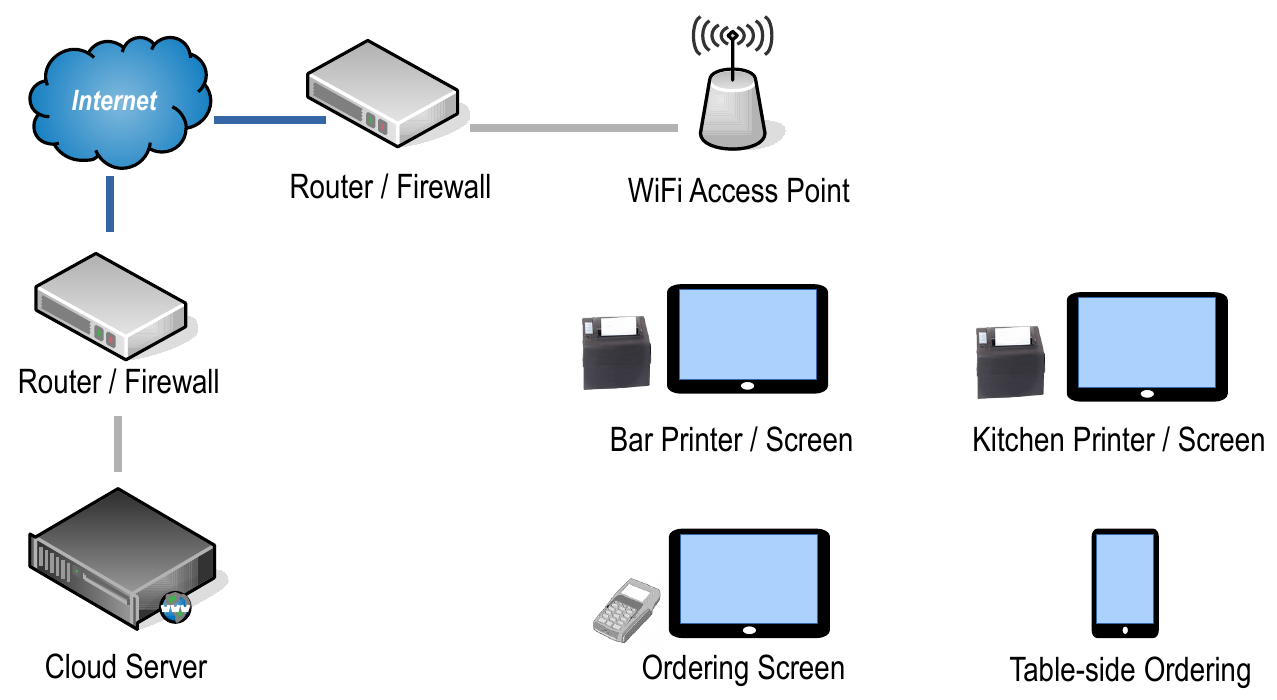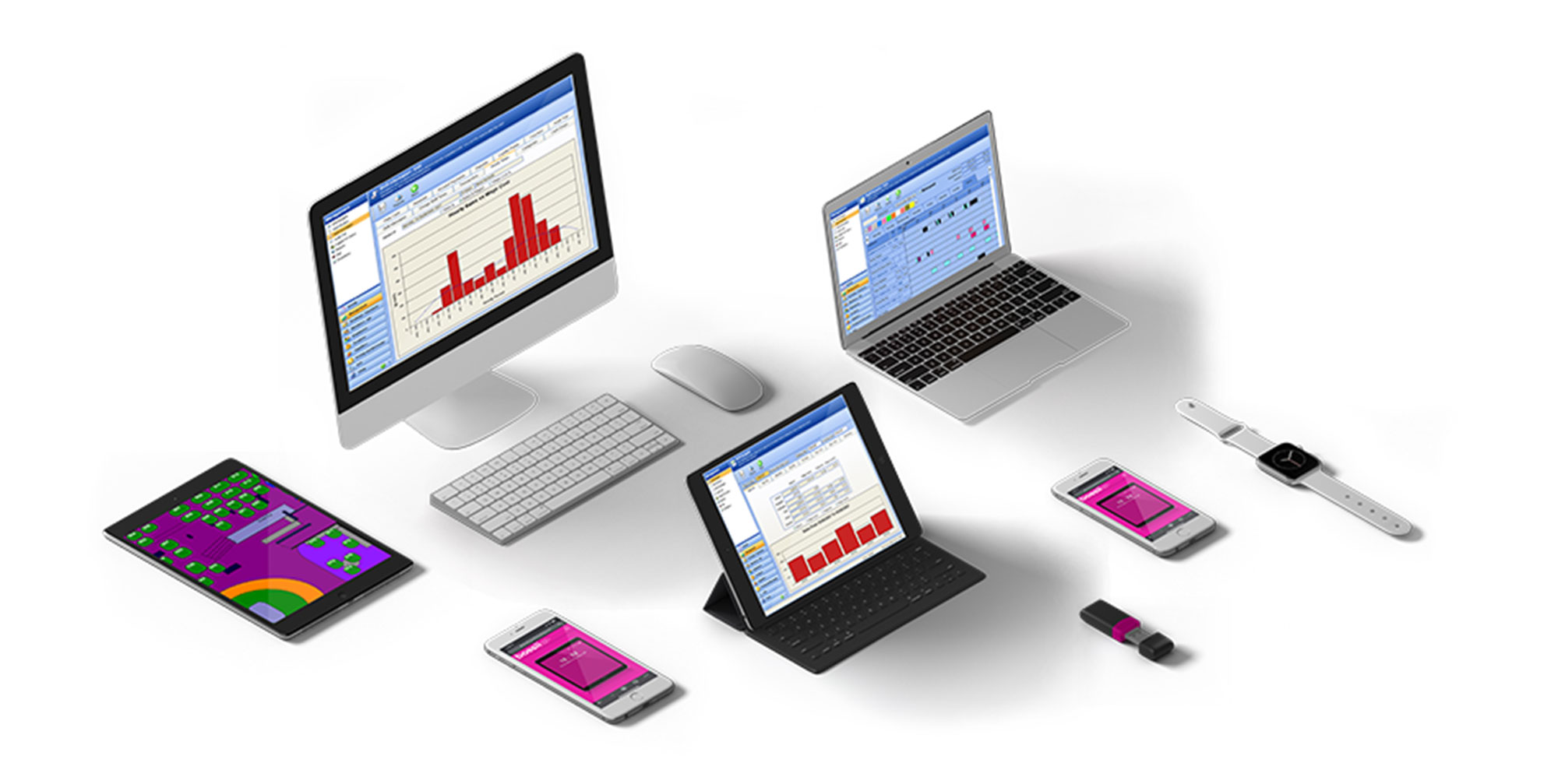Systems and applications from Google Play or Apple Store that use data hosted online are often called cloud solutions. In simple terms, this means that in cloud based POS systems data is stored somewhere on a cloud server which may be physically located in a different state or a different country. While in cloud based POS systems you have no control over location of your data and the servers running the system you are using, you do have a promise that the system will continue to operate and that your data will be sufficiently protected. Most often these servers are either housed in large Data Server farms such as Amazon Web Services or Microsoft Azure. These servers are managed and controlled by AWS or MA.
Whether you’re considering a cloud POS, or a non cloud based POS, Bossii can help. Choose us as the hospitality POS systems provider for your bar, pub, restaurant, or hotel. Contact us online, call 1300 805 511 or email admin@bossii.com to find out more about our solution.

You can use cloud based POS systems at locations where a reliable “always on” Internet connection is available and shared across all devices. In deference to a locally hosted data solution, all devices that have been approved to be used with your cloud system will need to send data across the Internet to complete POS operations. The Internet connection, in this case, is the primary network connection and the speed and reliability of that connection is absolutely crucial to the successful operation of a cloud POS.
A professional provider of cloud based POS systems should offer different fall-back options for when, or if, Internet connectivity fails, for example a local network fall-back feature which allows the system to continue working during Internet outages. This feature is different to a fail-over Internet connection using a cellular network offered by many providers, as it makes it possible to work with cloud based POS systems not only during Internet outages, but also if there is a problem with the cloud system itself.
If your cloud based POS systems provider does not offer any fail-over protection, you should reconsider using their services as your Internet WILL most certainly drop out at some point, and you will not be able to use your cloud POS system. It is not realistic to expect that your Internet connection will always be available and reliable.
The best cloud based POS systems include provision for an automated switching to a local network mode. This allows for data to be interchanged and stored locally until the Internet connection is restored and all information can be synchronised back to the cloud server.
One advantage of storing your data online is that there is less emphasis on backups, including offsite backups, less hardware required onsite, and consequently less hardware maintenance. You fully depend on the data protection and cloud system availability offered by your provider. Connection dropouts can be a risk to your business operations, and might impact your customers – the orders may not get processed until a connection is restored. Even if you revert to manual systems during outages, you will still need to enter all the data back into the system when it comes back online, or have to wait for systems to re-sync together. It is essential therefore, to have fallback redundancy.
Because some cloud POS providers do not offer local network fail-over functionality, when the Internet drops out, your machines are unable to communicate with each other. For example, if a server cashes out a customer’s tab on one device, the other device will not know about this event as they are not interconnected at that time. This could lead to bills on the other device(s) relating to that same tab not being merged while the Internet is down. If a local network fail-over is available, all machines can still communicate with each other regardless of any Internet dropouts. Once the Internet comes back up, the client’s tab data can be uploaded to the cloud.

Many cloud POS providers focus on low cost and high volume, there isn’t as much emphasis on redundancy as there should be for professional venue operators. You should take a very close look at what can happen when things go wrong as it can be critically important to your business. Some cloud POS providers will often only sell the dream rather than the reality, making it this much more important for you to be aware of the possible limitations of their systems.
One advantage of cloud based POS systems is that they require less hardware and have lower maintenance overheads. Usually, the venue can utilise any tablet device capable of connecting to the Internet instead of dedicated POS terminals communicating with a local server. However, high quality wireless access points and a business grade Internet connection MUST be in place at a very minimum. Using a modem supplied by your Internet provider is generally not an adequate solution that a professional venue requires.
Additionally, consider that that according to the worldwide Internet speed reports collected at by speedtest.net, Australia’s fixed-line Internet speed (as of mid 2024) is ranked in the 84th place in the world.
This is a big point to take into account when considering cloud POS solutions as it emphasises the need for redundancy options when using or considering investing in cloud based POS systems.
Source: https://www.speedtest.net/global-index
If you have a relatively simple menu, then a cloud based restaurant POS system might just be sufficient for your needs. Much of the initial setup work is usually completed by the client, but if you are working with a smaller budget, and if you can make your business fit the framework on offer, selecting the system with the best, local support should suffice. Remember that cloud based restaurant POS systems are often low cost-of-entry solutions and therefore the burden to set up, learn, and support the system is usually passed down to you. It is important to investigate and understand any extended support costs as the initial support included with many subscriptions is often not enough for you to gain the required level of proficiency in using your new cloud based restaurant POS system from a typical cloud POS provider.
Usually, the types of operations that a cloud POS system can safely handle are smaller establishments as this limits the risks associated with the potential outages. Cloud based POS systems, are typically not the best solution for a bustling pub, hotel, bar, or restaurant where you’re frequently 20 deep at a bar, or have 10 tables waiting to be seated. Cloud based restaurant POS systems can be perfectly adequate for a small café or a small intimate fine dining restaurant where few changes are required on the menu and where your upfront POS budget is relatively low.
Regardless of your preferences for cloud based POS systems, or a local POS systems, at Bossii we have a solution that’s perfect for your bar, pub, restaurant, hotel or other hospitality venue. Contact us online, call 1300 805 511 or email admin@bossii.com to find out more about our solution.
